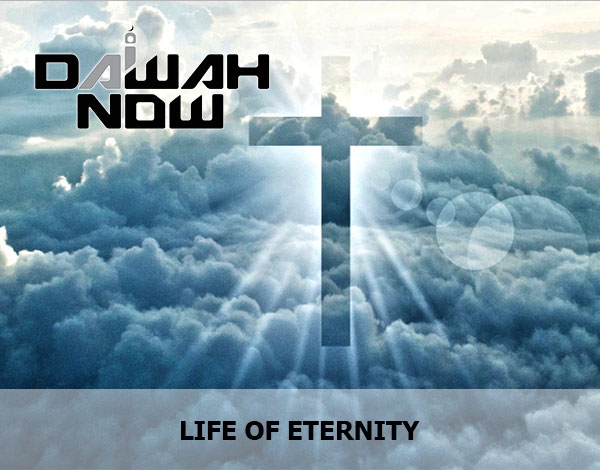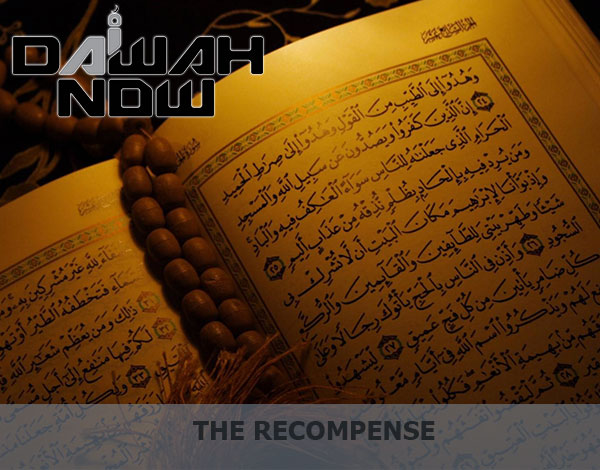The Death:
The almighty God (Allah) says in the Qur’an:
- Every soul will taste death. Then to Us will you be returned. [Qur’an: 29:57]
- Every soul will taste death. And We test you with evil and with good as trial; and to Us you will be returned. [Qur’an: 21:35]
- Every soul will have a taste of death, and you will receive your full recompense on the Day of Resurrection. Then, whoever is spared the Fire, and is admitted to Paradise, has indeed been successful. The life of this world is merely an enjoyment of delusion. [Qur’an: 03:185]
Regardless of faith, race, status or age, we will all die. While the certainty of death is universally accepted, the question of what happens afterwards has been debated throughout history. Islam teaches that one’s life doesn’t end on earth; rather, it is followed by the eternal life of the hereafter. This belief has a major impact on our earthly lives, while instilling hope for healing in a perfect world where The God’s ultimate justice will prevail.
Death is inevitable and is amongst the starkest realities of our lives. Despite its inevitability, we get so absorbed in living that we forget about death. Our daily routines, the comfort of our homes and our relationships keep us so busy that we have little time left to ponder over the fleeting nature of this world.
Then, suddenly, we are forced to face the reality of our existence when a loved one is afflicted with a debilitating disease or we experience a shocking loss. Helpless, we are jolted by the frailty of life, leading us to question our priorities and re-evaluate our lifestyles. It brings with it the opportunity to think and ponder over the very purpose of our life.
Remembering ‘death’ is considered important for every living soul and is encouraged in Islam. Death is the ultimate reminder of the ‘running out time’! It is encouraged that a Muslim remains ever-conscious of the approaching death, so that he accrues as much good as he could, before the death overtakes him. It is a constant reminder to all wise people to make hay while the sun is shining! Once the opportunity is lost, there is no second chance. It remains the ultimate desire of every Muslim to die, while he is Muslim (i.e. in the state of submission and obedience).
According to Islam, when confronted with a calamity, one should say, “To The God we belong and to Him we shall return” [Quran: 02:156]. This invocation is also recited when someone dies. Reminding us of our origin and our ultimate destiny, it puts the purpose of our lives in perspective. The God clearly states in the Qur’an that He has created humankind with freedom of choice and free-will, mainly to submit and obey Him, willingly and by conscious mind. Since, submission and obedience are the essence of worship in Islam, it encourages people to conduct every aspect of their lives with God-consciousness and in accordance with His commands.
O you who believe! Fear Allah as He should be feared, and do not die, except as Muslim (i.e. in the state of submission to Allah). [Qur’an: 03:102]
Muslims believe they will return to The God (Allah) when they die. Therefore, instead of the end, death becomes part of a continuum which stretches into eternity.
In Islam, death is ‘not’ the ultimate end of life, rather a simple transition of life or soul from this material world to another world. When a person dies, it is only the body that dies; whereas the soul is collected, and is kept in a state of slumber, within a separation / partition (called barzakh) by the command of The God. The soul will be revived on the Day of Reckoning & Judgement and will then be sent to it actual place of abode: The Heaven or The Hell, depending on the person’s deeds.
The Prophet Muhammad ﷺ once said, “When anyone of you dies, he is shown his place both in the morning and in the evening. If he is one of the people of Paradise; he is shown his place in it, and if he is from the people of the Hell-Fire; he is shown his place there-in. Then it is said to him, ‘This is your place till Allah resurrect you on the Day of Resurrection’.” [Source: Sahih al-Bukhari 1379; http://sunnah.com/bukhari/23/132].
The Prophet Muhammad ﷺ said, “Remember often the destroyer of pleasures (Haadhim al Ladhdhaat) – i.e. Death.” [Source: Al Tirmidhi: http://sunnah.com/riyadussaliheen/1/579; and Sunan ibn Majah 4258, http://sunnah.com/urn/1293610, Grade: Sahih (authentic) according to Al-Albany].
By remembering death, we purify our souls and actions from the allurement of this world. It helps in acknowledging our feebleness and helplessness before our Lord, to live this life with caution and hope, and to prepare and perform better in this life to succeed in the hereafter. This is how the Companions of the Prophet ﷺ lived.
The Reckoning
What happens after death? Does a world exist beyond this life? Is there such a place as heaven or hell? These are common questions we ask from time to time.
After all, the enigma of death stumps us. We’ve devised various ways of killing other humans. Yet, despite innumerable technological and medical advances, we still cannot prevent an individual from dying. Furthermore, unlike life which we experience daily, we really don’t have firsthand knowledge of state after death. Aside from some near-death incidents, no one has come back from the dead to tell us what they encountered.
Muslims know about the events that will occur after death through their belief and access to the word of The God (Allah) called the Qur’an. Not alone Muslims, almost all major world religions possess the concept of life after death, in some form or the other. In keeping with the universal message of The God, every prophet warned of the certainty of the after-life and each of the divine books speaks of the existence of the soul after death. In the Qur’an, The God promises, “Every soul will taste death. Then to Us will you be returned”. [Qur’an: 29:57]
The almighty God (Allah) further says in the Qur’an: Then, on that Day, you will be called to account for all the bounties you enjoyed. [Qur’an: 102:08]
We will, therefore, surely be asked on that Day about the blessings that The God bestowed upon us of good-health, security, provision, intelligence, capability, knowledge and so on, and how we responded to His blessings by being thankful to Him and by submitting to and obeying His commands; following His way; and worshipping Him alone.
Those who fulfilled their purpose in life and lived righteously will enter an eternal paradise of pure bliss. The people of heaven will reside in beautiful mansions, no longer suffering from fatigue, disease and old age. God will remove animosity and pain from people’s hearts, providing supreme healing in a world of abundance and luxury, of lush gardens and flowing rivers.
In contrast, those who die in a state of transgression against The God or oppress others will be led to Hellfire; because, despite all of The God’s blessings, they neglected their ultimate purpose of leading their lives in accordance with His Will and Guidance. The Quran describes Hell as a place filled with immense suffering, with extreme temperatures, unquenchable thirst and blazing flames.
Truly, The God wants each one of us to be salvaged in the after-life. He has sent guidance and provided signs for those who seek Him and reflect. At the same time, He has given us the choice to freely indulge in the world around us or to abide by His laws. In the Qur’an, The God declares, “Why should The God make you suffer torment if you are thankful and believe in Him? God always rewards gratitude and He knows everything” [Qur’an: 04:147].
On the Day of Judgment, every individual will be resurrected to account for their lives. The God describes this event in the Qur’an, “On that Day, people will come forward in separate groups to be shown their deeds: whoever has done an atom’s weight of good will see it, but whoever has done an atom’s weight of evil will see that” [Qur’an: 99:6-8].
The God will weigh everyone’s good and bad actions according to His Mercy and His Justice, forgiving many sins and increasing the reward for many noble deeds. One who excels in goodness will be rewarded generously, but one whose evils and wrongs outweigh his virtues will be punished.
Islam teaches that this life is simply a test to determine our place in the eternal life after death. Those who understand the reality are aware that their ultimate fate after death is based on their actions in this life. Such individuals are thankful for all the blessings that The God has given them and humbly worship Him while promoting goodness in all aspects of their lives. When a person embraces such a God-conscious way of life, their purpose extends beyond merely enjoying worldly pleasures.


